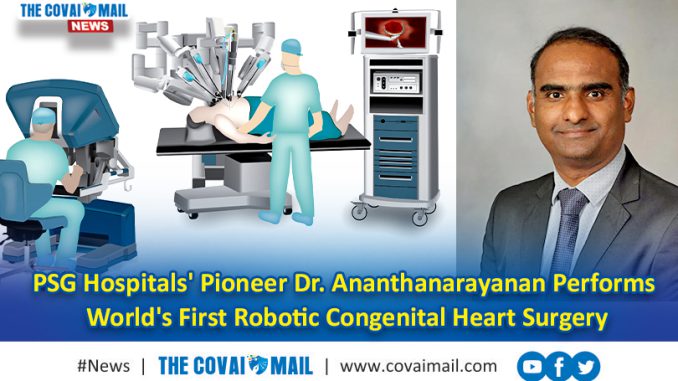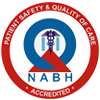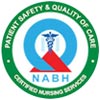PSG Hospitals’ Pioneer Dr. Ananthanarayanan Performs World’s First Robotic Congenital Heart Surgery

Dr. C. Ananthanarayanan, a Senior Consultant Cardiac Surgeon at PSG Hospital, has successfully performed the world’s first Robotic Congenital Heart Surgery, marking a significant milestone in cardiac care. In an exclusive interview, he emphasized the potential and advantages of Robotic Surgery over traditional methods.
Transition from Sternotomy to Minimally Invasive Robotic Procedures:-
Dr. Ananthanarayanan highlighted the unprecedented use of surgical robots to treat complex congenital heart diseases. This achievement breaks boundaries in the field, as surgical robots were previously used mainly for adult patients and their diseases. The precision of robotic vision played a crucial role in achieving results comparable to traditional sternotomy approaches.
The transition from traditional open-heart surgery, requiring sternotomy, to minimally invasive procedures has been rapid due to technological advancements. Dr. Ananthanarayanan emphasized that Robotic Heart Surgery represents the next evolutionary step, allowing surgeons to perform intricate procedures with enhanced precision and minimal invasiveness.
Minimal Blood Product Utilization:- The advantages of Robotic Heart Surgery are evident in the post-operative experience for patients. A notable benefit is the substantial reduction in post-operative pain, enabling a quicker return to normal activities. Unlike traditional heart surgeries requiring prolonged rest, patients undergoing Robotic Heart Surgery can resume regular activities within two weeks, significantly enhancing overall recovery times.
A key advantage lies in the minimal utilization of blood products during Robotic Heart Surgery. Unlike conventional surgeries that often require blood transfusions, this breakthrough reduces or eliminates the need for such transfusions. This not only benefits patients but also contributes to more efficient healthcare practices, conserving resources and minimizing risks associated with blood transfusions.
Life-altering Success Story:- Success stories exemplify the effectiveness of Robotic Heart Surgery. A 15-year-old girl with a complex birth defect named “Partial Atrio-Ventricular Canal Defect (P-AVCD)” underwent successful surgery to correct three defects inside her heart. Dr. Ananthanarayanan and his team, assisted by Robotic Thoracic Surgeon Dr. Saravana Rajamanickam, utilized a Surgical Robot to repair an underdeveloped valve, close a hole between upper heart chambers, and fix a malformed Tricuspid valve. Remarkably, the patient was discharged in just three days and is on track to resume studies within a week.
Dr. Ananthanarayan anticipates even more complex procedures becoming feasible through Robotic Heart Surgery in the future. PSG Hospital’s advanced robotic systems lay the foundation for further advancements in this cutting-edge field. The versatility of Robotic Heart Surgery offers expanded treatment options, providing patients with safer and more effective alternatives.
A New Era In Cardiac Care:- In conclusion, Robotic Heart Surgery has ushered in a new era of cardiac care, offering enhanced outcomes, reduced pain, and quicker recovery times. PSG Hospitals, guided by Dr. Ananthanarayanan, have emerged as pioneers in this revolutionary approach, shaping the future of cardiovascular surgery. As robotic technology is embraced by the medical community, routine performance of even the most intricate cardiac procedures can be anticipated with the remarkable precision and efficiency of robotic-assisted surgery.

 Dr. C. Ananthanarayanan, a Senior Consultant Cardiac Surgeon at PSG Hospital, has successfully performed the world’s first Robotic Congenital Heart Surgery, marking a significant milestone in cardiac care. In an exclusive interview, he emphasized the potential and advantages of Robotic Surgery over traditional methods.
Dr. C. Ananthanarayanan, a Senior Consultant Cardiac Surgeon at PSG Hospital, has successfully performed the world’s first Robotic Congenital Heart Surgery, marking a significant milestone in cardiac care. In an exclusive interview, he emphasized the potential and advantages of Robotic Surgery over traditional methods.











